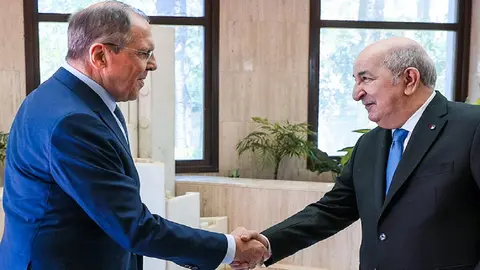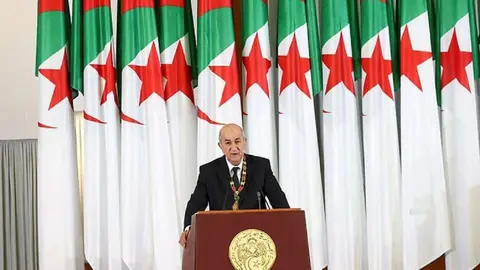Tebboune unsettles the West with visit to Moscow

The proximity between Algiers and Moscow has never been a secret. They have made no attempt to hide a harmony that has historically united the two administrations, but which distances Algeria from the Western camp. Abdelmajdid Tebboune's government's non-positioning on Russia's invasion of Ukraine was intended to maintain an increasingly complicated balance in its alliances with the major powers. Although with a notorious preference for the Kremlin, Algiers has always tried to get along with Washington. However, Algeria's latest moves have not gone down well with the White House, which is watching Tebboune's latest visit to Russia with reluctance.
One of the priorities that prompted the president to travel to Moscow was his country's desire to join the BRICS, an economic and trade organisation comprising Brazil, India, Russia, China and South Africa. A year ago, Tebboune stated that "joining this group would make Algeria, a pioneer of non-alignment, safe from the friction between the two poles". These words were followed shortly afterwards by a formal request from Algeria. The hope is that this new visit will give the definitive boost to the country's membership, which, according to Algeria, also has the approval of South Africa and Brazil.

Joining the BRICS is accompanied on the agenda by another of the strong points on Algeria's roadmap, namely the strengthening of its partnership with Russia. And it is precisely this, added to the timing of the Algiers meeting, that has provoked some misgivings in France, with whom the president had agreed to meet at the same time. The disagreements with Paris are one of the many problems that surround the Algerians, who are going through one of their most complicated moments in terms of diplomatic relations with their neighbours.
In order not to deepen this discontent, Algerian sources consulted by the Al Arab media outlet claim that the Algerian delegation has preferred to avoid any kind of rapprochement on arms issues, which could make things even worse with the West. For this reason, they have focused their visit on the St Petersburg International Economic Forum, where cooperation agreements have been discussed in various fields such as technology, agriculture and tourism. One of the most important was the establishment of an investment promotion agency to support Algerian and foreign businessmen wishing to launch investment projects.
Mikhail Bogdanov, the Russian president's special representative for the Middle East and Africa, described Tebboune's visit as a historic event. During his stay in Russia, he inaugurated a monument to the founder of the modern Algerian state, Emir Abdelkader, which added symbolism to the Algerian president's trip. However, it has not all been good news for Algiers. Observers point to an increasingly strained relationship with the West, and especially with its traditional ally France. Macron's country had hoped to have been able to meet with a Tebboune who has postponed his visit to Paris, scheduled for last May.

It is this increasingly distant stance from its theoretical Western partners that worries the international community. Algeria has too many open fronts and, far from resolving them, seems unconcerned about closing the cracks with France and Spain, both of which are increasingly close to Morocco's regional rival. Morocco's regional leadership is growing with the passage of time and Algeria is not taking a direction that moves it even to compete, while Rabat is advancing in its relations and, above all, gaining more and more followers in the Saharan dossier, apparently forgotten by Algiers.
Tebboune has taken a step that continues to tilt its foreign policy towards the east and sets a trend that could end up burying any chance of reconciliation with former allies. His pretensions of regional leadership have overshadowed a reality that, as the weeks go by, looks more and more complicated for Algeria.










